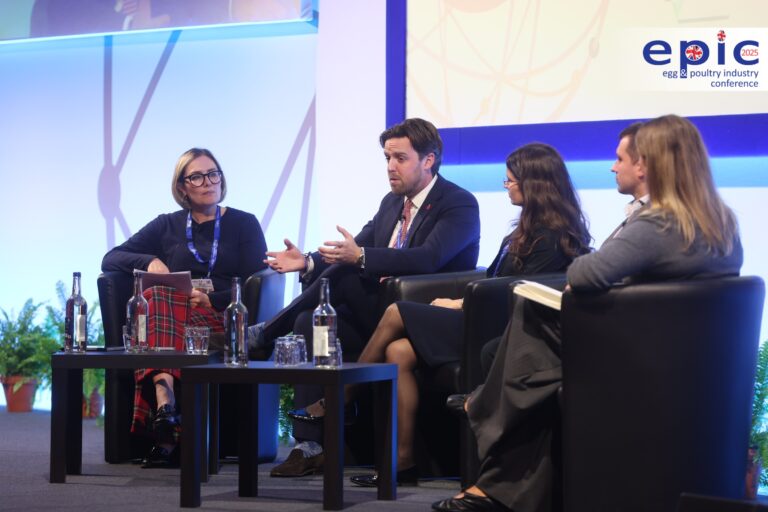EPIC 2025 was all about looking ahead to the strategies that would help the industry succeed in the years leading up to 2050. And in the next generation session, four people in the first decade of their career joined PB editor Chloe Ryan on stage to discuss their visions for the industry of 2050, and the lessons they’ve learned navigating a “perma-crisis” environment.
Representing farming, nutrition, business ownership and communications, George Roach of Oakland Farms, Dr Sylwia Sobolewska from Trouw Nutrition, Gwesyn Davies of Ellis Eggs, and Kerry Maxwell, communications manager of the British Poultry Council each brought a fresh perspective on the challenges and opportunities shaping the years ahead.
Resilience
For George Roach, a third-generation farmer running Oakland Farms, the past decade has been one long stress test for the industry – from Brexit and avian influenza to inflation and soaring energy costs.
“Given those challenges in less than a decade, it’s hard to imagine what 2050 will look like,” he said. “But it’s proven that this industry is incredibly resilient. We adapt, we collaborate, and we keep moving forward.”
That collaborative instinct, he believes, has been a lifeline during times of crisis.
“When you’re under pressure like that, you have to work together — whether that’s with processors, feed companies, or suppliers. We’re all working towards the same goals, and that makes life an awful lot easier.”
Opportunity in uncertainty
For Gwesyn Davies, who took over Ellis Eggs following the loss of his father, turbulent times also created openings.
“The past few years have brought a lot of change – Brexit, inflation, labour shortages – but that’s also created opportunity,” he said. “Agriculture’s been slow-moving, and some of that change has encouraged renewal. Without those disruptions, I’m not sure the opportunities I’ve taken on would have existed.”
He’s since grown his business from 32,000 to over 240,000 birds across seven sites, proof that ambition and agility still count for a lot.

Investing for the long term
While volatility is never far away, George Roach believes that now is a good time to reinvest.
“Feed prices are low, liveweight prices are high. We’re in a good cycle. If we can’t reinvest now, we never will,” he said. “Make the investment, bank the profits for a few years, and use this time to strengthen the business for whatever comes next.”
Both Roach and Davies see technology as essential to that resilience, not just for efficiency, but for people.
“We need technology that gives staff a better quality of life,” said Roach. “Younger people want evenings and weekends, and if remote monitoring or automation makes that possible, it helps everyone.”
Davies agreed. “Attracting and keeping young people means making these jobs liveable. My team is very young – 18 to 32 – and that work-life balance is key to retaining them.”
A nutritionist’s perspective
For Sylwia Sobolewska, the industry’s next big opportunities lie in science and communication. A poultry nutritionist who has worked across Europe, she’s passionate about translating research into practice and educating consumers on issues such as the return of white eggs.
“We had white eggs before the 1970s, then brown eggs became seen as healthier and more ‘natural’. But white eggs are just as good and often more sustainable,” she said. “We need to re-educate consumers, show them through packaging, social media and schools that they’re the same, maybe even better.”
Sobolewska believes investment in pullet nutrition and feed technology will be crucial to sustainability: “Pullets don’t give us eggs, so people often forget about them. But if we invest in pullets, we’ll have stronger layers, longer laying cycles and better welfare. That’s the direction the future is going.”
Purpose and the power of storytelling
The conversation turned from farms to philosophy with Kerry Maxwell, communications manager at the British Poultry Council.
Maxwell challenged the audience to rethink what “strategy” really means.
“I came across a quote that said you need to find out who you are and act with purpose – not just on purpose,” she said. “Strategy is your plan; posture is how you move towards that plan. It’s about showing up intentionally.”

For Maxwell, communication must be collaborative, confident, and honest.
“We often mistake strategy for posture, but posture is how we show up. We have nothing to hide in this industry, and we should stop talking only to ourselves. We need to open the doors and tell our story with courage.”
That openness, she argued, is key to countering misinformation and connecting with the public: “If people don’t want to talk to us, they just won’t. So we have to make ourselves as visible and approachable as possible, showing the real people and real work behind food production.”
Technology and AI
When asked how artificial intelligence might change their work, the panel’s responses ranged from caution to curiosity.
“Every time I use AI, I feel I lose a little bit of critical thinking,” admitted Maxwell. “It’s powerful, but I’m wary of outsourcing originality.”
Sobolewska, however, was more optimistic: “I use AI as a first source to summarise scientific papers or check trends. It saves time, but we must remember it’s just a tool. It should make us better, not replace our thinking.”
For Roach, AI’s strength lies in everyday efficiency: “It’s great for basic admin tasks, generating forms, converting PDFs, writing up policies. It saves hours on jobs that don’t need to be manual.”
“I talk to people I trust”
When an audience member asked, “With so much information — and misinformation — out there, how do you decide what to trust and where do you get your information from?”, it struck a chord with all four speakers.
For Davies, owner of Ellis Eggs, the best information doesn’t come from algorithms or headlines, it comes from people.
“There’s so much noise out there,” he said. “I find the best way to stay informed is to talk to people I trust – producers, vets, and customers who are on the ground every day. You can’t beat real conversations.”
Davies’ approach is simple but effective, relying on relationships. “If I see something online that doesn’t sound right, I’ll pick up the phone. Most of the time, you get a much clearer, more honest picture from someone you know.”
Finding confidence
The conversation also turned to imposter syndrome, a theme that resonated across the panel. The panel admitted that, particularly early in their careers, they had questioned whether they belonged in rooms full of established experts.
Sobolewska reflected that even after completing a PhD and leading international projects, she sometimes felt that sense of doubt – but said connecting with supportive mentors and peers made all the difference. Roach echoed this, adding that running a business at a young age can make you feel exposed, but surrounding yourself with good people helps build confidence.
“Everyone feels it at some point,” he said. “The key is realising that asking questions doesn’t make you inexperienced, it makes you better at what you do.”
The discussion underlined how common imposter syndrome remains in agriculture, particularly among young leaders stepping into senior roles.
Asked whether they would encourage young people to enter the poultry sector, all four panellists gave a resounding yes.
“I’m not that old myself and I’ve chosen to join it,” said Roach. “Poultry’s stable, growing, and full of opportunities, on farm and beyond.”
Sobolewska added: “People outside the industry don’t realise how advanced it is – the technology, science, travel, and collaboration. It’s so much more than people think.”
Davies agreed, noting that the industry’s openness about business and profit is a strength rather than a flaw: “We shouldn’t be ashamed of being profitable — without that, we’re not sustainable. It’s what makes this industry forward-looking.”
For Maxwell, the pull is personal: “People work in food, energy or healthcare because they believe in the story behind it. If we can help people connect with the story of feeding the nation, they’ll want to be part of it.”


